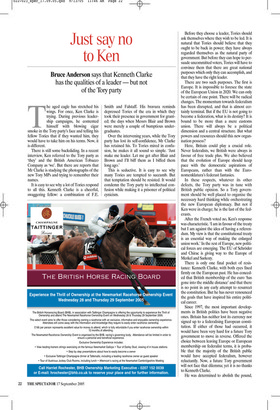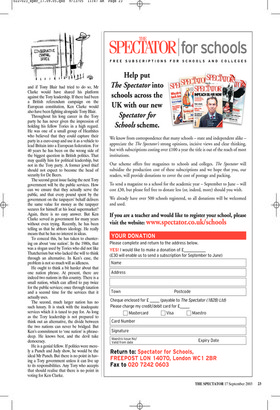Just say no to Ken
Bruce Anderson says that Kenneth Clarke has the qualities of a leader — but not of the Tory party The aged eagle has stretched his wings. For once, Ken Clarke is trying. During previous leadership campaigns, he contented himself with blowing cigar smoke in the Tory party’s face and telling his fellow Tories that if they wanted him, they would have to take him on his terms. Now, it is different.
There is still some backsliding. In a recent interview, Ken referred to the Tory party as ‘they’ and the British American Tobacco Company as ‘we’. But there are reports that Mr Clarke is studying the photographs of the new Tory MPs and trying to remember their names.
It is easy to see why a lot of Tories respond to all this. Kenneth Clarke is a cheerful, swaggering fellow: a combination of F.E. Smith and Falstaff. His bravura reminds depressed Tories of the era in which they took their presence in government for granted; the days when Messrs Blair and Brown were merely a couple of bumptious undergraduates.
Over the intervening years, while the Tory party has lost its self-confidence, Mr Clarke has retained his. To Tories mired in confusion, he makes it all sound so simple. ‘Just make me leader. Let me get after Blair and Brown and I’ll biff them as I biffed them long ago.’ This is seductive. It is easy to see why many Tories are tempted to succumb. But that temptation should be resisted. It would condemn the Tory party to intellectual confusion while making it a prisoner of political cynicism. Before they choose a leader, Tories should ask themselves where they wish to be led. It is natural that Tories should believe that they ought to be back in power; they have always regarded themselves as the natural party of government. But before they can hope to persuade uncommitted voters, Tories will have to convince them that there are great national purposes which only they can accomplish, and that they have the right leader.
There are two such purposes. The first is Europe. It is impossible to foresee the state of the European Union in 2020. We can only be certain of one point. There will be radical changes. The momentum towards federalism has been disrupted, and that is almost certainly terminal. But if the EU is not going to become a federation, what is its destiny? It is bound to be more than a mere customs union. There will always be a political dimension and a central structure. But what powers and resources should this new organisation possess?
Here, Britain could play a crucial role. Never federalists, we British were always in favour of free trade plus. We also believed that the evolution of Europe should keep pace with the democratic aspirations of Europeans, rather than with the Euronomenklatura’s federast fantasies.
In these respects, whatever its other defects, the Tory party was in tune with British public opinion. So a Tory government should be well placed to organise the necessary hard thinking while orchestrating the new European diplomacy. But not if Ken were in charge; he is the last of the federasts.
After the French voted no, Ken’s response was characteristic. ‘I am in favour of the treaty but I am against the idea of having a referendum. My view is that the constitutional treaty is an essential way of making the enlarged union work.’ In the rest of Europe, new political forces are emerging. The EU of Schröder and Chirac is giving way to the Europe of Merkel and Sarkozy.
There is only one final pocket of resistance: Kenneth Clarke, with both eyes fixed firmly on the European past. He has conceded that British membership of the euro ‘has gone into the middle distance’ and that there is no point in any early attempt to resurrect the constitution. But he has never renounced the goals that have inspired his entire political career.
Since 1997, the most important developments in British politics have been negative ones. Britain has neither lost its currency nor signed up to a federalising European constitution. If either of those had occurred, it would have been very hard for a future Tory government to move in reverse. Offered the choice between leaving Europe or European membership on federalist terms, it is probable that the majority of the British public would have accepted federalism, however reluctantly. Now, a future Tory government will not face that dilemma; yet it is no thanks to Kenneth Clarke.
He was determined to abolish the pound, and if Tony Blair had tried to do so, Mr Clarke would have shared his platform against the Tory leadership. If there had been a British referendum campaign on the European constitution, Ken Clarke would also have been fighting alongside Tony Blair.
Throughout his long career in the Tory party he has never given the impression of holding his fellow Tories in a high regard. He was one of a small group of Heathites who believed that they could capture their party in a euro-coup and use it as a vehicle to lead Britain into a European federation. For 40 years he has been on the wrong side of the biggest question in British politics. That may qualify him for political leadership, but not in the Tory party. A former jewel thief should not expect to become the head of security for De Beers.
The second great issue facing the next Tory government will be the public services. How can we ensure that they actually serve the public, and that every pound spent by the government on the taxpayers’ behalf delivers the same value for money as the taxpayer secures for himself at his local supermarket? Again, there is no easy answer. But Ken Clarke served in government for many years without even trying. Recently, he has been telling us that he abhors ideology. He really means that he has no interest in ideas.
To conceal this, he has taken to chuntering on about ‘one nation’. In the 1980s, that was a slogan used by Tories who did not like Thatcherism but who lacked the will to think through an alternative. In Ken’s case, the problem is not so much will as idleness.
He ought to think a bit harder about that one nation phrase. At present, there are indeed two nations in this country. There is a small nation, which can afford to pay twice for the public services; once through taxation and a second time for the services that it actually uses.
The second, much larger nation has no such luxury. It is stuck with the inadequate services which it is taxed to pay for. As long as the Tory leadership is not prepared to think out an alternative, the divide between the two nations can never be bridged. But Ken’s commitment to ‘one nation’ is phrasedeep. He knows best, and the devil take democracy.
He is a genial fellow. If politics were merely a Punch and Judy show, he would be the ideal Mr Punch. But there is no point in having a Tory government unless it can live up to its responsibilities. Any Tory who accepts that should realise that there is no point in voting for Ken Clarke.




















































 Previous page
Previous page